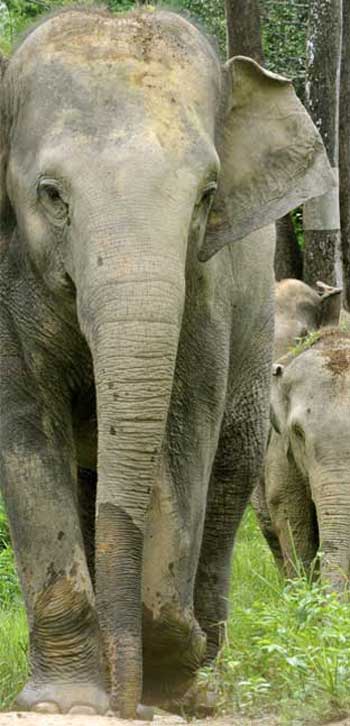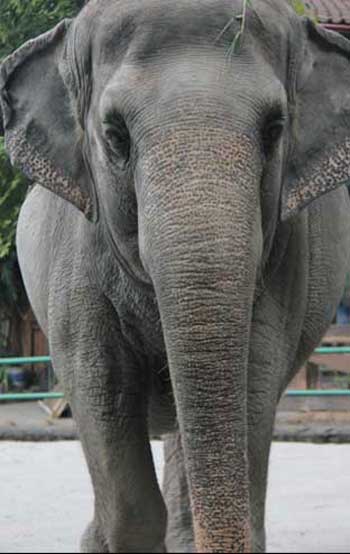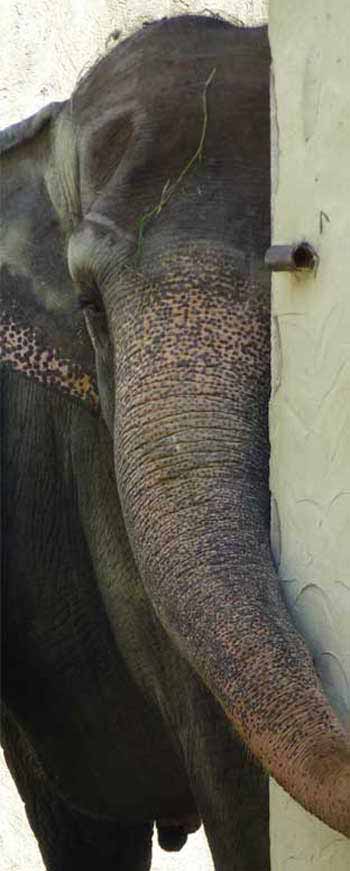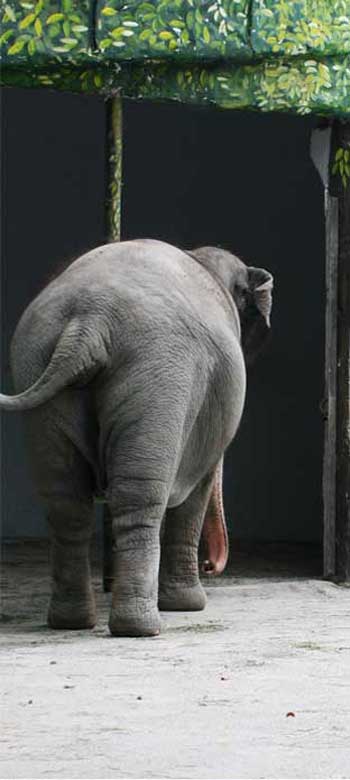"The Manila Zoo has failed Mali. Not only is she suffering from isolation and captivity-induced foot problems, I've also learned that she has not even had basic blood work conducted in the three and a half decades that she's been at the zoo. The demonstrated lack of preventive care and prophylactic treatment is indicative of the inadequate expertise available to Mali. This elephant has suffered long enough."—World-renowned animal conservation expert Dr. Jane Goodall
© BLES / Ali Bullock

"Mali was brought here in the Philippines way back in 1977 as a gift from Sri Lanka and as then First Lady, I had the privilege to welcome her to our country. She was indeed a very precious symbol of friendship between the two countries. However, at present, many experts and animal rights advocates have suggested to transfer Mali to a sanctuary, where she can roam freely, socialize with other elephants, and live in her natural habitat, but at the same time, be properly monitored by elephant-care experts who would look after her health. … Though Mali would be greatly missed, I will be happy to see her embark on a journey towards a better life."—Congressperson Imelda R. Marcos
"I understand that veterinary inspections have highlighted problems with cracked feet, skin sores and ulcers, and excess weight, all of which are attributable to the lack of space and concrete floor in Mali's current enclosure. These problems can only be resolved by removing Mali to an environment where she has large areas of natural ground to roam and forage over. Aside from the negative physical implications of keeping elephants in small concrete enclosures, my primary concern is the psychological trauma Mali will have endured from being kept alone and isolated from her species for 33 years."—Dr. Lucy Bates, Honorary Research Fellow, University of St. Andrews (Scotland)
"The sanctuary in Thailand could provide [Mali] with all the things that the Manila Zoo could not, including the care of experts and the company of other elephants. Several elephant experts have said that Mali is suffering from a number of ailments, including a potentially fatal foot condition."—Philippine Sen. Miriam Defensor-Santiago
"I am certain that if you had had the opportunity, as I have, to witness the emotional lives of wild elephants who are highly intelligent and social animals, you would take immediate action to end Mali's suffering by transferring her to a sanctuary. … To these impressive beings, the importance of family and friends cannot be underestimated. While I was watching elephants in the Samburu National Reserve in Northern Kenya, I noticed a teenaged female, who had been named Babyl, who walked very slowly and had difficulty taking each step. I learned that she'd been crippled for years but that the other members of her herd never left her behind. They'd walk a while, then stop and look around to see where she was. If Babyl lagged behind, some would wait for her. If she'd been left alone, she would have fallen prey to a lion or another predator. Sometimes the matriarch of the herd would even feed Babyl. Babyl's friends had nothing to gain by helping her, as she could do nothing for them. Nonetheless, they adjusted their behavior to allow Babyl to remain with the group."—Marc Bekoff, Ph. D., Professor Emeritus, Ecology and Evolutionary Biology, University of Colorado (U.S.)
"It has been 35 years now since the most well-known elephant in the country arrived and has since become a source of amusement for Filipinos, both young and old. Unfortunately, however, Mali's living condition has now become deplorable and not anymore conducive for her to live safely and healthily."—Senate leader Juan Ponce Enrile

"I am frankly puzzled, if not a bit angered, by the refusal of Manila Zoo officials to consent to have Mali shipped off to an elephant sanctuary. What possible harm could be done by bringing an elephant out of the zoo? Perhaps they're worried it would be taken as a judgment on their competence, if not their compassion. But by sending off Mali to a place where she could enjoy freedom and the company of other elephants, they would be demonstrating their concern for the elephant and the other zoo occupants, even if it means losing a prime attraction." —Rina Jimenez-David, columnist for the Philippine Daily Inquirer
"Mali's solitary condition and tiny cemented enclosure at the Manila zoo is sad and depressing. Surely many more tourists and locals would be more saddened by Mali's life confined to a barren, decrepit enclosure than those who would be amused by it. The time is now for the Philippines to follow the lead of other countries around the world whose zoos are closing their elephant exhibits."—Compassion and Responsibility for Animals

"Despite the good intentions of volunteers and administrators, a great number of elephant experts who have already submitted their opinions and letters agree that the condition that Mali is kept in is inhumane. These pachyderm experts recommend that the best thing for her is to be transferred to a sanctuary."—Philippine Animal Welfare Society
"Thanks to a directive from President Benigno Simeon Aquino III and the work of PETA, a sanctuary could offer 'Mali' a chance to save her from years of boredom and misery, and above all, save her life. … 'Mali' might have a few years to live but these remaining years will be more expressive of man's compassion towards [God's other] creatures." —The Most Rev. José S. Palma, archbishop of Cebu and president of the Catholic Bishops' Conference of the Philippines (CBCP)
"Just like humans, animals form complex social groups. Female elephants spend their entire lives surrounded by others of their own kind in herds consisting of extended family members. … [M]any scientific studies have found that elephants who are kept in groups exhibit less stereotypical or repetitive behavior, indicating that they are less stressed. … I look forward to the day when Mali will leave our nation and begin her journey on the path toward a better, happier, and more fulfilled life."—Imam Council of the Philippines Chair Aleem Said Ahmad Basher and President Imam Ebra M. Moxsir
"In addition to the emotional suffering that Mali endures every single day, the Manila Zoo has also proved that they are unable to care for her health. We have learned that in the entire time she has been at the zoo, Mali has not had adequate foot care or blood work. In the wild, elephants roam vast territories over a variety of substrates, but Mali has little room to walk in her concrete pen. This means that her cuticles have become overgrown and the pads of her feet have become cracked, which could lead to infection if they continue to be left untreated."—Sri Lanka Wildlife Conservation Society
"It is an elephant's destiny and deepest joy to wander great distances with their family and herd members by their side. Elephants have a complex social system that includes continuous communion throughout the day with family members and herds from distant regions. Elephant social structure and familial bonds are similar, if not deeper, than that of human beings. … For the Manila Zoo to ignore this call to action reflects their self-interest and has nothing to do with Mali's welfare or elephant conservation and education."—Kelly and Richard Probst, founders of Elephant Advocacy (U.S.)
"Thirty-five years is a heavy sentence to bear, longer than is served by most murderers. Mali has paid the penalty for not being fortunate enough to be born human. Now it is time to release her."—Nobel laureate J.M. Coetzee
"[Mali's] current facility is one of the worst I have seen. The concrete she is forced to walk on inside and outside is damaging to her feet and bones. … In addition, the concrete is surely humid most of the time, given the climate in the Philippines. Humidity will cause arthritis and can cause foot disease and other problems. … There is nothing more important to a female elephant than her family and being among other elephants. It is totally unacceptable and terrible that Mali has been in isolation for 33 years of her life."—Dr. Marion E. Garaï, Ph.D., chair of Space for Elephants Foundation (South Africa), chair of Elephant Specialist Advisory Group (South Africa), and consultant for the European Elephant Group
"Elephants are animals who are totally unfit for captivity. … The life expectancy of Asian elephants is estimated at 70 years, so Mali has lived half of her life, and after all these years of exploitation and slavery, it is a matter of duty to give her back her freedom."—Film legend Brigitte Bardot
"Conditions such as those that Mali has endured in Manila Zoo for 35 years, deprived of contact with [her] own kind, are guaranteed to ensure a wretched and unhappy life, and will lead to an early death."—David Hancocks, a former zoo director who has been involved in managing and planning zoos for more than four decades
"Mali is cruelly denied stimulation, room to explore, and everything else that is natural and important to her. … She circles her little patch of concrete, travelling the same route again and again and again. This kind of obsessive, repetitive behaviour—known as 'zoochosis'—suggests that Mali is in danger of going insane, so time is of the essence."—Famed musician Morrissey
"Elephant herds are matriarchal, which means that they are guided by the oldest females in the herd. Normally, the oldest female with the most life experience will be in charge of making sure her herd is safe and can guide her herd to the best water holes and feeding grounds … To no degree is the zoo where Mali is currently being kept in relaying any educational information to the general public on elephants. More than anything, it is exposing a disgraceful situation which needs urgent correction." —Petra ten Velde, consultant, Sacred Earth Encounters (South Africa)
"Female elephants are highly intelligent and are known to have a very complex social network. Born into a family, females stay with this family for the rest of their lives, taking care of each other and keeping vocal contact even when separated for a short period of time during feeding. Female elephants, besides primates, are the most social creatures that I have ever experienced. Keeping such a social animal isolated from conspecifics, leads to abnormal behaviour and a poor general state of health."—Dr. Angela Stoeger-Horwath, Department of Cognitive Biology, University of Vienna (Austria)

"Even more crucially than physical space, Mali's residence at the Manila Zoo cannot offer appropriate social conditions for a female elephant. It is aberrant for elephants to be kept in solitary conditions: In the wild, female elephants live in families, with companionships that may persist for 60 years or more. Female elephants have been shown to recognise at least 100 other female companions … and will daily reinforce their social bonds through intense greeting ceremonies, as well as repeated tactile contacts (rubbing against one another, sleeping while leaning on each other, and touching each other with trunks and tails). Research in the wild has shown that disturbed elephant populations who have suffered family structure breakdown due to poaching exhibit chronic increases in stress hormone levels. … I would argue that the removal of companions and lack of emotional support have placed Mali under similar stress levels, and this severely compromises both her psychological well-being and her physical condition."—Dr. Vicki Fishlock, research associate, Amboseli Trust for Elephants (Kenya)
"I understand completely all the issues that must be taken into account when it comes to arriving at a decision to provide appropriate care for the lone Asian elephant Mali. … I know that after carefully weighing all the options you will agree that relocating Mali [is] the appropriate thing to do for her well-being."—Philip K. Ensley, D.V.M., diplomat, American College of Zoological Medicine (U.S.)
"Elephants are social animals, and female elephants stay in their herds for their entire lives. … [T]he suffering that [Mali] endures on a daily basis is incomprehensible."—Asia for Animals Coalition, on behalf of 10 different organizations
"Keeping a single female elephant in limited space in inadequate captive conditions is also severely damaging to the animal's mental health. For such social animals to be deprived of social interaction with other elephants clearly causes the animal acute suffering."—World Society for the Protection of Animals
